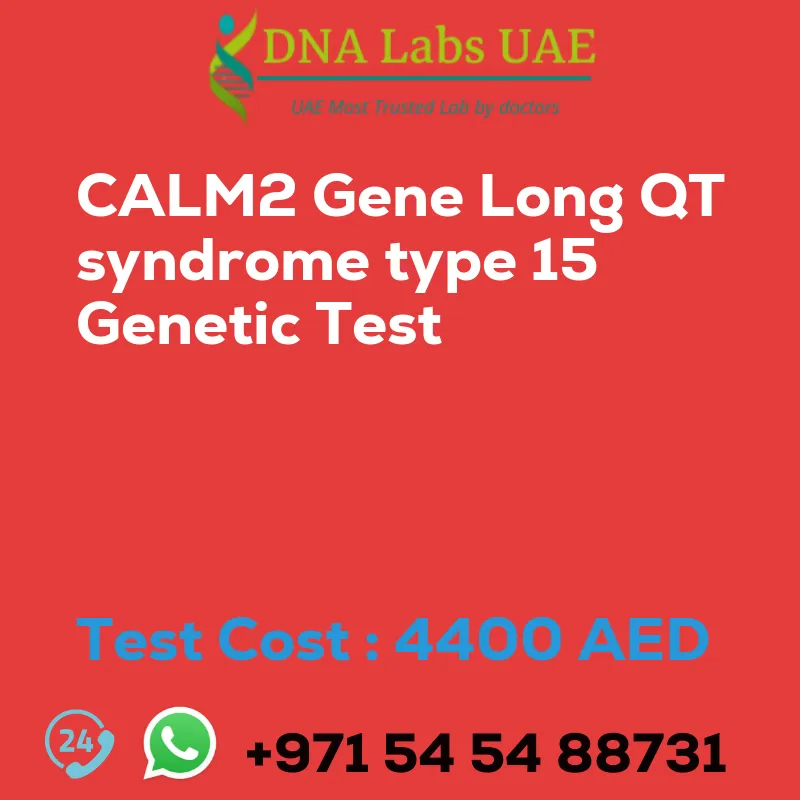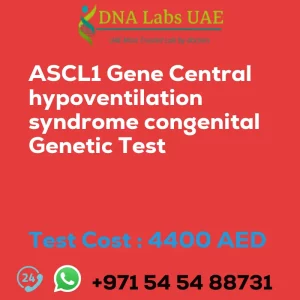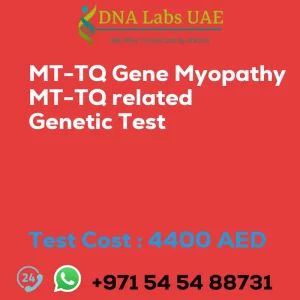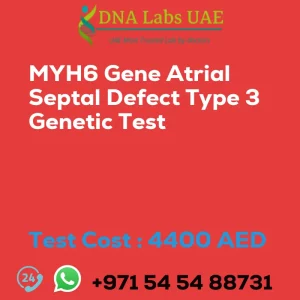CALM2 Gene Long QT Syndrome Type 15 Genetic Test
Introduction
The CALM2 gene is associated with Long QT syndrome type 15 (LQT15), a rare genetic disorder affecting the electrical activity of the heart. This disorder can lead to abnormal heart rhythms, increasing the risk of fainting, seizures, and sudden cardiac arrest.
Test Details
The CALM2 Gene Long QT syndrome type 15 Genetic Test is a comprehensive genetic test that utilizes Next-Generation Sequencing (NGS) technology. NGS testing allows for the simultaneous analysis of multiple genes, including the CALM2 gene, to identify any variations or mutations associated with LQT15.
Components
- Test Name: CALM2 Gene Long QT syndrome type 15 Genetic Test
- Price: 4400.0 AED
- Sample Condition: Blood or Extracted DNA or One drop Blood on FTA Card
- Report Delivery: 3 to 4 Weeks
- Method: NGS Technology
- Test Type: Cardiovascular Pneumology Disorders
- Doctor: Cardiologist
- Test Department: Genetics
Pre Test Information
Prior to undergoing the CALM2 Gene Long QT syndrome type 15 NGS Genetic DNA Test, it is important to provide the clinical history of the patient. A genetic counseling session may also be conducted to create a pedigree chart of family members affected by LQT15 and the CALM2 gene.
Test Process
The NGS genetic test for LQT15 involves obtaining a DNA sample, typically through a blood or saliva sample. The DNA is then sequenced using NGS technology to analyze the CALM2 gene and other relevant genes associated with Long QT syndrome. The results of the test can confirm a diagnosis of LQT15 and provide information about the specific genetic mutation or variation present in the CALM2 gene.
Importance of Test Results
The results of the NGS genetic test can be valuable for genetic counseling, family planning, and guiding treatment decisions. It is crucial to note that NGS genetic testing may not be available at all healthcare facilities and may require a referral to a specialized genetic testing laboratory. Therefore, it is recommended to consult with a healthcare professional or genetic counselor for further information and guidance regarding genetic testing for Long QT syndrome type 15.
| Test Name | CALM2 Gene Long QT syndrome type 15 Genetic Test |
|---|---|
| Components | |
| Price | 4400.0 AED |
| Sample Condition | Blood or Extracted DNA or One drop Blood on FTA Card |
| Report Delivery | 3 to 4 Weeks |
| Method | NGS Technology |
| Test type | Cardiovascular Pneumology Disorders |
| Doctor | Cardiologist |
| Test Department: | Genetics |
| Pre Test Information | Clinical History of Patient who is going for CALM2 Gene Long QT syndrome type 15 NGS Genetic DNA Test. A Genetic Counselling session to draw a pedigree chart of family members affected with CALM2 Gene Long QT syndrome type 15 NGS Genetic DNA Test gene CALM2 |
| Test Details |
The CALM2 gene is associated with Long QT syndrome type 15 (LQT15). LQT15 is a rare genetic disorder that affects the electrical activity of the heart, leading to abnormal heart rhythms (arrhythmias). It is characterized by a prolonged QT interval on an electrocardiogram (ECG), which can increase the risk of fainting, seizures, and sudden cardiac arrest. NGS (Next-Generation Sequencing) genetic testing is a method used to analyze multiple genes simultaneously to identify any variations or mutations that may be associated with a particular condition. In the case of LQT15, NGS testing can be used to identify any variations or mutations in the CALM2 gene that may be causing the disorder. The NGS genetic test for LQT15 typically involves obtaining a DNA sample, usually through a blood sample or a saliva sample. The DNA is then sequenced using NGS technology to analyze the CALM2 gene and other relevant genes associated with Long QT syndrome. The results of the NGS genetic test can help in confirming a diagnosis of LQT15 and can also provide information about the specific genetic mutation or variation present in the CALM2 gene. This information can be useful for genetic counseling, family planning, and potentially guiding treatment decisions. It is important to note that NGS genetic testing may not be available at all healthcare facilities and may require a referral to a specialized genetic testing laboratory. Additionally, it is recommended to consult with a healthcare professional or a genetic counselor for further information and guidance regarding genetic testing for Long QT syndrome type 15. |








